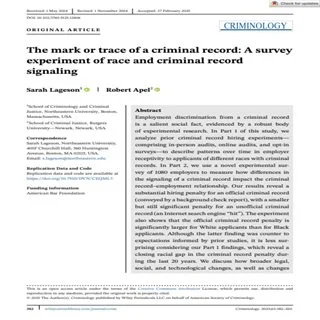By Sarah Lageson and Robert Apel
Employment discrimination from a criminal record is a salient social fact, evidenced by a robust body of experimental research. In Part 1 of this study, we analyze prior criminal record hiring experiments—comprising in-person audits, online audits, and opt-in surveys—to describe patterns over time in employer receptivity to applicants of different races with criminal records. In Part 2, we use a novel experimental survey of 1080 employers to measure how differences in the signaling of a criminal record impact the criminal record–employment relationship. Our results reveal a substantial hiring penalty for an official criminal record (conveyed by a background check report), with a smaller but still significant penalty for an unofficial criminal record (an Internet search engine “hit”). The experiment also shows that the official criminal record penalty is significantly larger for White applicants than for Black applicants. Although the latter finding was counter to expectations informed by prior studies, it is less surprising considering our Part 1 findings, which reveal a closing racial gap in the criminal record penalty during the last 20 years. We discuss how broader legal, social, and technological changes, as well as changes in methodologies, impact our understanding today of criminal records, race, and employment.
Criminology, Volume 63, Issue 2 May 2025 Pages 382-410




